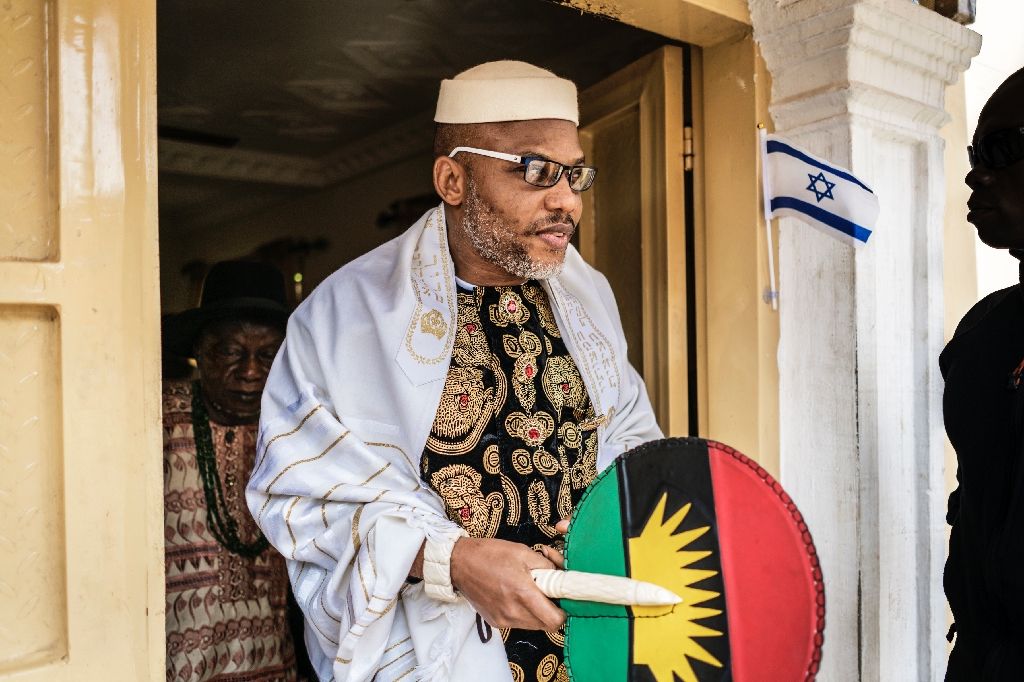Will Nnamdi Kanu’s arrest end the agitation for Biafra?
A recent report by The Cable has it that Nnamdi Kanu, leader of the Indigenous People of Biafra (IPOB) has been arrested and has been extradited to Nigeria to face trial.

A recent report by The Cable has it that Nnamdi Kanu, leader of the Indigenous People of Biafra (IPOB) has been arrested and has been extradited to Nigeria to face trial.
According to the report Kanu is facing charges bordering on treasonable felony instituted against him at the federal high court in Abuja in response to years of the campaign for the independent Republic of Biafra through IPOB.
Who is Nnamdi Kanu?
Nnamdi Kanu is the leader of the Indigenous People of Biafra (IPOB) a group that agitates for the secession of Biafra from Nigeria.
Kanu who founded IPOB in 2014 had initially stated that the main aim of IPOB is to create an independent state for the people of the old Eastern Region of Nigeria through an independence referendum.
It should be noted that the demand for secession of Biafra from Nigeria by Chukwuemeka Ojukwu was what led to Civil War in 1967 where 0ver 2 million Igbos were killed and many thousands more were displaced.
Kanu was a relatively obscure figure until 2009 when he started Radio Biafra, a station that called for an independent state for the Igbo people and broadcast to Nigeria from London.
Though he grew up in Nigeria’s south-east and went to the University of Nsukka, Mr. Kanu moved to the UK before graduating.
Soon after setting up IPOB, he spoke to gatherings of the large Igbo diaspora, calling for Biafran independence. In some of his comments, he urged Biafrans to take up arms against the Nigerian state.
Kanu was however arrested in his Lagos hotel, shortly after arriving in Nigeria for a visit on 14 October 2015 and was detained for more than a year, despite various court orders that ruled for his release.
He was charged with “criminal conspiracy, intimidation, and membership of an illegal organization” – charges that could amount to treason
He was However granted bail in April 2017 for health reasons but skipped bail after flouting some of the conditions given to him by the court He has also been on the run since then.
Despite the court’s insistence on his appearance, Nnamdi Kanu remained abroad, and once said he jumped bail to pursue the cause of Biafra.
Owing to his absence in court, Binta Nyako, the judge who granted him bail, revoked it and ordered that he should be arrested.
Kanu, however, dismissed the arrest warrant issued against him and vowed to remain abroad to continue agitating for Biafra.
IPOB was later declared a terrorist group by the Federal Government and the court following a clash between the military and protesters at Nnamdi Kanu house in Umuahia, the capital of Abia state.
Why is IPOB agitating for Biafra now?
It has been earlier established that the agitation for Biafra began a few years after the country gained its independence from its British colonial master, noting that the agitation led by Lt. Colonel Odumegwu Ojukwu was what eventually led to the civil war.
According to reports and documented history, the agitation for Biafra resulted from political, economic, ethnic, cultural, and religious tensions which preceded Britain’s formal decolonization of Nigeria from 1960 to 1963.
Other factors included ethnoreligious violence and anti-Igbo pogroms in Northern Nigeria, a military coup, a counter-coup, and persecution of Igbo living in Northern Nigeria. Control over the lucrative oil production in the Niger Delta also played a vital strategic role.
Within 3rd year of the Civil War, the Federal Government troops surrounded Biafra, capturing coastal oil facilities and the city of Port Harcourt. The blockade imposed as a deliberate policy during the ensuing stalemate led to mass starvation. During the two and half years of the war, there were about 100,000 overall military casualties, while between 500,000 and 2 million Biafran civilians died of starvation
The war cost the Igbos a great deal in terms of lives, money and infrastructure. It has been estimated that up to one million people may have died due to the conflict, most from hunger and disease caused by Nigerian forces. More than half a million people died from the famine imposed deliberately through blockade throughout the war. Lack of medicine also contributed. Thousands of people starved to death every day as the war progressed.
Several years after the end of the devastating civil war in which government troops fought and defeated Biafran secessionists, the dream of independence has not completely died.
To this day, many Igbos complain that they were punished economically after the war and still speak of being marginalised. The fact that no Nigerian president has come from the east is a source of much rancour.
According to a research by Babcock University, The problem of underdevelopment, high level of poverty, inequality in resource sharing, and wealth control and in the socio-political composition of the Nigerian state, has greatly fueled the agitation for Biafra.
While those publicly clamouring for independence are a very small minority, it is not hard to find young people who feel they would be better off as a separate nation.
Will Nnamdi Kanu arrest end the agitation for Biafra?
